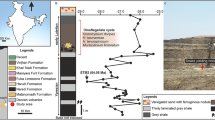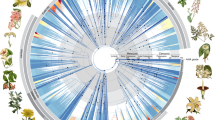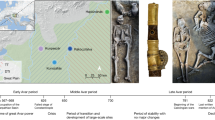Abstract
SEVERAL radiocarbon dates have recently become available which necessitate a rather drastic revision of the chronology of the Stone Age south of the Limpopo River1. An important consequence of the new time scale is that there is now strong evidence to suggest a very early appearance of Homo sapiens sapiens in Africa—considerably earlier than in the Middle East and Europe. It thus seems possible to envisage the continent of Africa as the area where much of modern man's early evolutionary development took place.
This is a preview of subscription content, access via your institution
Access options
Subscribe to this journal
Receive 51 print issues and online access
$199.00 per year
only $3.90 per issue
Buy this article
- Purchase on Springer Link
- Instant access to full article PDF
Prices may be subject to local taxes which are calculated during checkout
Similar content being viewed by others
References
Beaumont, P. B., and Vogel, J. C., Afric. Studies (in the press).
Clark, J. D., The Prehistory of Southern Africa (Penguin, Harmondsworth, 1959).
Deacon, J., Ann. Cape Prov. Mus., 5 (1966)
Vogel, J. C., Radiocarbon, 12, No. 2, 444 (1970).
Louw, A. W., Brain, C. K., Vogel, J. C., Mason, R. J., and Eloff, J. F., S. Afric. Archaeol. Bull., 24 (1969).
Goodwin, A. J. H., and van Riet Lowe, C., Ann. S. Afric. Mus., 27 (1929).
Malan, B. D., Proc. First Pan-African Cong. Prehist. (Blackwell, Oxford, 1952).
Beaumont, P., S. Afric. Archaeol. Bull., 18 61 (1963).
Vogel, J. C., and Marais, M., Radiocarbon, 13, 378 (1971).
Cooke, H. B. S., Malan, B. D., and Wells, L. H., Man, 3, 6 (1945).
Goodwin, A. J. H., Ann. S. Afric. Mus., 24, 1 (1929).
Keller, C. M., S. Afric. Archaeol. Bull., 25, 47 (1970)
Vogel, J. C., and Waterbolk, H. T., Radiocarbon, 9, 146 (1967).
Sampson, C. G., Nas. Mus. Bloemfontein, Mem. 4, 110 (1968).
Stapleton, P., and Hewitt, J., S. Afric. J. Sci., 24, 574 (1927).
Buckley, J. D., Trautman, M. A., and Willie, E. H., Radiocarbon, 10, No. 2, 290 (1968).
Oakley, K. P., S. Afric. Archaeol. Bull., 9, 84 (1953).
van Riet Lowe, C., S. Afric. J. Sci., 26, 623 (1929).
Singer, R., and Smith, P., Amer. J. Phys. Anthrop., 31, 256 (1969).
Oakley, K. P., Proc. Third Pan-African Cong. Prehist. (edit. by Clark, J. D.), 76 (Chatto and Windus, London, 1957).
Leakey, R. E. F., Butzer, K. W., and Day, M. H., Nature, 222, 1132 (1969).
News and Views, Nature, 222, 1117 (1969).
Vogel, J. C., S. Afric. J. Sci., 67, 39 (1971).
Author information
Authors and Affiliations
Rights and permissions
About this article
Cite this article
VOGEL, J., BEAUMONT, P. Revised Radiocarbon Chronology for the Stone Age in South Africa. Nature 237, 50–51 (1972). https://doi.org/10.1038/237050a0
Received:
Revised:
Issue Date:
DOI: https://doi.org/10.1038/237050a0
This article is cited by
-
Middle and Later Stone Age lithic technology and land use in East African savannas
The African Archaeological Review (1994)
-
The Middle Stone Age south of the Limpopo River
Journal of World Prehistory (1992)
-
The archaeological significance of animal bones from Acheulean sites in southern Africa
The African Archaeological Review (1988)
-
Retrogression rate of the Victoria Falls and the Batoka Gorge
Nature (1976)
Comments
By submitting a comment you agree to abide by our Terms and Community Guidelines. If you find something abusive or that does not comply with our terms or guidelines please flag it as inappropriate.



